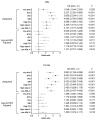Association between Abdominal Obesity and Cardiovascular Risk Factors in Adults with Normal Body Mass Index: Based on the Sixth Korea National Health and Nutrition Examination Survey
- PMID: 31909369
- PMCID: PMC6939698
- DOI: 10.7570/jomes.2019.28.4.262
Association between Abdominal Obesity and Cardiovascular Risk Factors in Adults with Normal Body Mass Index: Based on the Sixth Korea National Health and Nutrition Examination Survey
Abstract
Background: Abdominal obesity predisposes individuals to cardiovascular disease, but the data in adults with normal body mass index (BMI) are relatively rare. This study aimed to evaluate the characteristics of subjects with normal BMI and abdominal obesity and to identify the relationship between central obesity and cardiovascular risk factors in normal BMI adults in Korea.
Methods: Ten thousands six hundred thirty-four adults with BMI between 18.5 to 24.9 kg/m2 who participated in the sixth Korea National Health and Nutrition Examination Survey were included. Abdominal obesity was defined as a waist circumference of ≥90 cm in males and ≥85 cm in females. Through logistic regression, we analyzed the factors influencing abdominal obesity and the relationship between abdominal obesity and cardiovascular risk factors.
Results: The prevalence of abdominal obesity in adults with normal BMI was 6.9% for males and 7.7% for females, and this prevalence tended to increase with age. When adjusted for age and BMI, daily excessive alcohol consumption increased the risk of abdominal obesity in adults of normal weight. Women with lower socioeconomic status and men in need of walking exercise also had a higher risk of abdominal obesity. In the model adjusted for age and BMI, abdominal obesity was associated with fasting glucose intolerance and diabetes in men and hypertriglyceridemia and low high-density lipoprotein cholesterol in women.
Conclusion: Cardiovascular risk factors were associated with abdominal obesity in Korean adults with normal BMI. These results suggest that more careful management of abdominal obesity in those with normal weight is necessary.
Keywords: Abdominal obesity; Cardiovascular disease risk factors; Normal body weight.
Copyright © 2019 Korean Society for the Study of Obesity.
Conflict of interest statement
CONFLICTS OF INTEREST The authors declare no conflict of interest.
Figures

References
-
- World Health Organization, Regional Office for the Western Pacific. The Asia-Pacific perspective: redefining obesity and its treatment. Sydney: Health Communications Australia; 2000.
LinkOut - more resources
Full Text Sources

